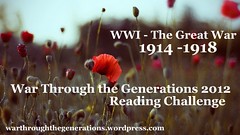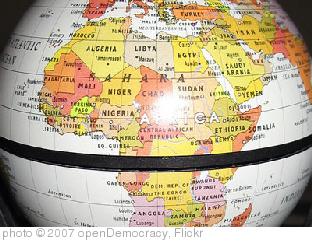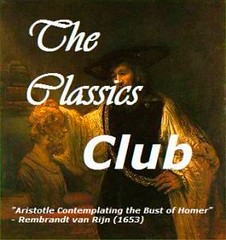“The alleys, the houses, the palaces and mosques and the people who live among them are evoked as vividly in [Mahfouz’s] work as the streets of London were conjured up by Dickens.” ~Newsweek
 I was struggling through Mr. Mahfouz’s epic novel, the first part of a trilogy set in modern Cairo, Egypt, and in the middle I read the above blurb on the cover. The comparison helped. I still didn’t like the people in the book, especially the men, nor did I ever, ever while reading this novel have any desire to visit Egypt in the twentieth century or even now. However, there is a Dickensian connection—or maybe a nineteenthe century connection since Mr. Mahfouz cites his favorite authors as “Flaubert, Balzac, Zola, Camus, Tolstoy, Dostoevsky, and above all Proust.” I can see a little of all of those men’s influence in the novel. Notice that Mr. Mahfouz, who “lives in Cairo with his wife and two daughters,” does not name any female authors among his influences. Therein lies a tale.
I was struggling through Mr. Mahfouz’s epic novel, the first part of a trilogy set in modern Cairo, Egypt, and in the middle I read the above blurb on the cover. The comparison helped. I still didn’t like the people in the book, especially the men, nor did I ever, ever while reading this novel have any desire to visit Egypt in the twentieth century or even now. However, there is a Dickensian connection—or maybe a nineteenthe century connection since Mr. Mahfouz cites his favorite authors as “Flaubert, Balzac, Zola, Camus, Tolstoy, Dostoevsky, and above all Proust.” I can see a little of all of those men’s influence in the novel. Notice that Mr. Mahfouz, who “lives in Cairo with his wife and two daughters,” does not name any female authors among his influences. Therein lies a tale.
Of all the books I have ever read, this one is the most likely to turn me into a flaming feminist. The men in the novel, as in Islamic culture?, are self-centered, egotistical, hypocritical tyrants. If I had to choose between living in World War I-era Egypt, where Palace Walk takes place, and Victorian England, the home of those notorious tyrants Mr. Murdstone, Bill Sikes, and Wackford Squeers, I’d take my chances in jolly old England. At least in England I’d be able to leave the house on occasion.
The mother of the family in Palace Walk, Amina, leaves her home three or four times during the course of the novel, a time period of three or four years. She attends the weddings of her daughters, and she dares to go to a religious shrine once while her husband is out of town–with predictably disastrous consequences. Otherwise, Amina and her daughters are not allowed to even look out the window, lest they be seen by a man and become “fallen women.”
So the women in Palace Walk are firmly controlled, tyrannized, and abused by the central character of the novel (surely not the Hero), the father, al-Sayyid Ahmad Abd al-Jawad. This patriarch has a split personality: he is friendly, amiable, good-humored, and popular with his drinking buddies and paramours, of whom he has many, but at home he is a stern, grim, autocrat who rules his family with invective and fear. Oh, but they all love and respect him. Al-Sayyid Ahmad is a god in his own home, ruling over a collection of cloistered, intimidated women and three sons who are molding themselves in his image–when they are not cowering in his shadow.
The story also deals with the way the outside world impinges on the lives of the al-Sayyid (or al-Jawad?) family. As the novel begins it’s 1917, and the British are ruling Egypt although the occupation force seems to be mostly Australian. As World War I comes to a close, one of the sons, Fahmy, becomes involved in the anti-British independence movement. However, even when dealing with political and religious changes outside the home, the novel never loses its claustrophobic feel, always circling back to the home and the sense of imprisonment that each of the family members feels, even the men. After a while, it made me want to break out, screaming.
I’m glad to have read Palace Walk. I might, in a year or two, want to read the next book in Mahfouz’s Cairo Trilogy, Palace of Desire, in which novel I am told some women actually get to go to school! The main problem I had with this first novel is that I could find nothing attractive about the characters or the culture in this story, nothing with which to identify. I wanted the British “oppressors” to win and reform the country and let the women and servants out of their slavery. But none of the women in this novel would have had the spine or or imagination to take advantage of such a liberation, and the British didn’t seem to be headed in that direction anyway.


 And it is part mystery and part love story with a bit of psychological thriller and a ghost thrown in for free. The setting is the summer of 1914, just before the outbreak of World War I in southern France, near Basque country. Our narrator is a middle-aged Basque doctor who is recalling, in 1938 on the eve of yet another war, the days of his youth before he went off to fight in the Great War.
And it is part mystery and part love story with a bit of psychological thriller and a ghost thrown in for free. The setting is the summer of 1914, just before the outbreak of World War I in southern France, near Basque country. Our narrator is a middle-aged Basque doctor who is recalling, in 1938 on the eve of yet another war, the days of his youth before he went off to fight in the Great War.







